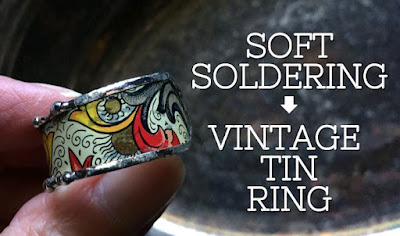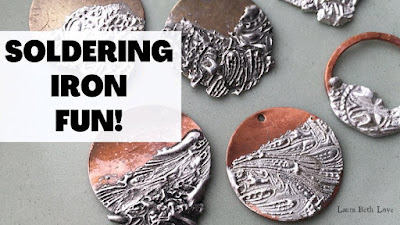Using pretty ribbon is a great alternative to standard chain when creating a necklace! Ribbon adds color, charm, and softens the allover design of your project, and is a great way to give your jewelry projects a unique, personalized look. For the project in the photos, I used a 3/8" wide (9.5mm), soft, ombre dyed ribbon. The 3/8" is my personal ideal ribbon width for ribbon necklaces, but you can use wider or narrower ribbon if you like. Just don't go too thin or too wide or you may find it difficult to wrap with wire. The same goes for stiffer ribbon materials. I find that thinner, softer ribbons are easier to wrap with wire and are easier to work with in general. You can also use as many strands of ribbon as you like. For the project shown, I used four lengths of ribbon that I sandwiched together. Idea: Try using a variety of coordinating colors together!
I attached the ribbon to my focal pendant at two points by threading it through two jump rings that were attached to my pedant (one on each end of the pendant), which you will see in the following project steps. On to the tutorial!
Materials needed:
Ribbon (I used eight - 18" to 20" strands of ribbon, four for each side of my necklace)
22 gauge wire (two 10" lengths and two 6" lengths)
Jewelry pliers (I use flat nose or rosary pliers)
Pearls or beads that will fit onto your wire
Side cutters
Focal pendant with jump rings attached
Necklace clasp
6mm (or larger) jump rings to finish the clasp-ends of your ribbon
Gather your ribbons together so that the ends are laying flat against each other in your fingers. I used a group of four ribbons, and I like to make them long - I measured mine to be about 18" to 20" in length.
You will need two of whatever you measure - one group of ribbons to attach to each side of your focal pendant.
Use scissors to trim the ribbon ends at an angle so that the ends come to a point.
Hold your ribbon ends together, keep that point intact!
Thread your ribbon ends through the jump ring on one end of your focal pendant.
Once all of your ribbon ends are threaded through your jump ring, gather the ends neatly together and then trim them straight across with scissors.
Next, neatly fold the ribbon ends that you just trimmed back against your long lengths
of ribbon.
Now it's time to add wire!
I like to use either 20 or 22 gauge wire. If you use a gauge that is too heavy it will be difficult to wrap the wire tightly enough around the ribbon for it to be secure.
Also, if you are going to add beads or pearls to your wire, don't forget to make sure that the beads or pearls fit onto the wire before you start wrapping.
To begin, cut a 10" (25.4cm) length of 22 gauge wire. Position one end of the wire beneath where you folded over the ribbon ends, leaving about 1" of wire extending from below the other side of the ribbon. While you position the wire, be sure to hold down the ribbon ends, keeping them gathered neatly together as shown in the above photo.
Now for the tricky part! Once you have the wire positioned below the ribbon, use your fingers to bend either one of the wire ends around your ribbon, wrapping it as tightly as you can.
While doing this, you will have to firmly hold onto your ribbon against the wire,
keeping them in place against each other so that the ribbons do not move around while you are wrapping the wire. Continue to wrap the wire as tightly as you can. Remember that these wraps are what will be holding your necklace together, so you do not want them to be weak. Make eight or nine wraps an then stop if you are planning on adding pearls or beads.
After you have made about eight or nine wraps, it's time to add some beads or pearls to your wraps. To do this, thread a pearl or bead onto your wire, and slide it down the wire until it is flush against the ribbon.
Use your finger to hold the pearl against your wraps and then continue to make two or three more wraps around your ribbon with your wire.
Now add a second pearl or bead to your wire, and as you did with the first pearl, push it down your wire until it is flush against your other wraps, positioning it as you see fit, and
then continue to wrap the tail end of wire firmly around your ribbon.
I like to make my wraps kind of free-form with no particular rhyme or reason. I love the handcrafted, organic look of wraps that were clearly done by hand and not by a machine!
To finish your wrap, continue wrapping the tail of wire around your wraps until you are very close to the end of your wire. I then like to use a pair of jewelry pliers to tightly pull on the end of wire to help tighten up the wire against the ribbon. Next, snip off any excess wire length from the end of the wire (if needed) with your side cutters. Use your jewelry pliers to tuck the end of the wire into your previous wraps. Repeat this process with a second group of ribbons, wire, and pearls/beads, attaching them to the second jump ring on the other end of your focal pendant.
To finish off the clasp ends of your ribbon necklace, repeat this process on the end of each side of your ribbon necklace: simply gather the ribbon ends neatly together and then trim them with scissors so that the ends are all the same length.
Then use a 6" length of wire to tightly wrap the ribbon ends on one side of your necklace together four to five times and then stop and thread on a 6mm (or larger) sized jump ring. Next continue to tightly wrap the wire until you reach the end, tucking it into the previous wraps. Repeat on the opposite side and then attach your clasp to one of your jump rings on one of your ribbon ends. That's it!
Join me on YouTube at https://www.youtube.com/laurabethlove
Have a great week!
Laura
Laura
Article copyright ©Laura Beth Love 2022 and may not be republished in print or other media without express written permission from the author. For any link updates or corrections leave correct info in comment area





















